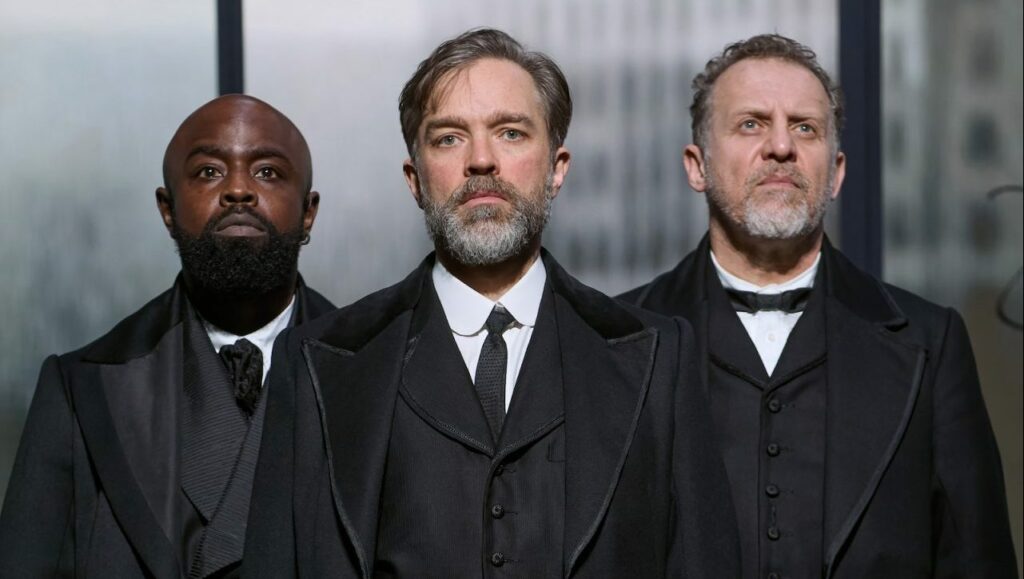
by Jim Keaveney.
The National Theatre’s Tony Award-winning production of The Lehman Trilogy returns to London for its second West End appearance, this time at the Gillian Lynne Theatre. Having so far clocked up runs at the National Theatre and Picadilly Theatre in London, off-Broadway’s Armory Theatre, Broadway’s Nederlander Theatre and Los Angeles’ Ahmanson Theatre, it’s safe to say it’s already a hit and expectations are high. It does not disappoint.
Adapted by Ben Power and directed by Sam Mendes, Stefano Massini’s play chronicles the history of the three Lehman brothers, Henry (Nigel Lindsay), Emanuel (Michael Balogun) and Mayer (Hadley Fraser), and their sons and grandsons.
The brothers are 19th-century Bavarian Jewish immigrants who set up home in Alabama, selling fabrics, including the new style of ‘den-im’ fabric that doesn’t tear. Eventually, via cotton, coffee and cash, both they and the business relocate to New York City, where they establish Lehman Brothers; a bank that would become the fourth-largest investment bank in the United States before its dramatic collapse in 2008.
The real triumph of Mendes’s production is how it turns this potentially dense and technical drama into what is a powerful family drama that never feels overlong or overwrought. Pianist Yshani Perinpanayagam’s accompaniment, composed by Nick Powell, is expertly judged driving the drama forward and giving it a sense of urgency, occasionally heightened by the ticking of a boardroom clock.
Though Lindsay, Balogun and Fraser notionally play the three brothers, in reality, they play the brothers, their sons, grandsons, wives, girlfriends, neighbours, colleagues, and a Wall Street tightrope artist. All three are exceptional, each needing only the drop of a shoulder, a squint or a hunch to inhabit new character after new character, giving each a full life.
Something could also be said too about the play’s portrayal of female characters; they feel like boxes that are being ticked, much like in Phillip Lehman’s journal. Maybe it is in part due to the subject matter and the era(s) in which the play is set – this is a play about business and money, and from Henry’s arrival in 1844 to Bobbie’s death in 1969 the female role was very much not in the boardroom. Herbert H. Lehman rightly had a problem with that.
As with previous runs, the final third still feels a little rushed as we zoom through the second half of the 20th century and towards collapse but by then the Lehman name is only on the sign on the building; there are no Lehman names in the boardroom – so maybe that’s the point. For the Lehman’s, the story is over. But it’s a sensational story, sensationally told.















